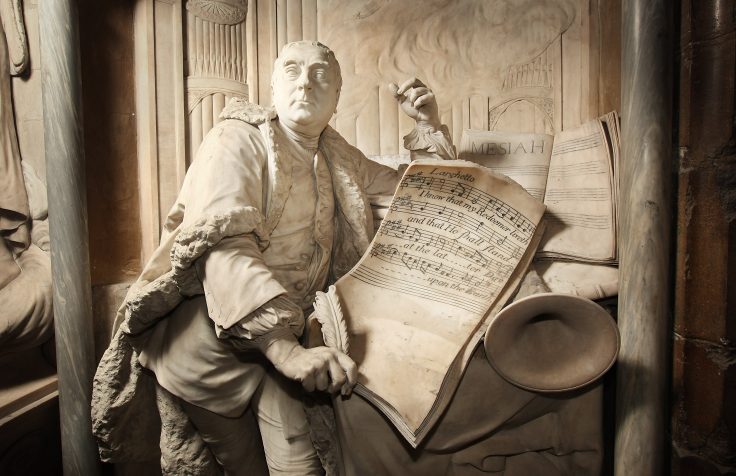Getting a Handel on Success
How a composer’s life can be a template for the West

Although he wrote it for Easter, George Frideric Handel’s Messiah is a December fixture in concert halls across the country. According to legend, King George II was so moved during the Hallelujah chorus that he leapt to his feet, thus starting the tradition of the audience standing for the choral showstopper. Handel composed some of the greatest treasures of Baroque music. His career, however, shows off the Anglo-American strategy for world domination.
The first step is to create a thriving, dynamic economy. Handel was born in 1685, three years before England’s Glorious Revolution brought William and his wife to the throne. When the royal couple left Holland to rule Mary’s home country, they brought the legal and financial innovations that had made the Dutch rich. During Handel’s lifetime, London transformed itself from a fire- and plague-ridden backwater on the outskirts of Europe into the center of global power.
Welcoming the world’s best minds and putting them to work is the next step. Handel was born in Halle, Germany, and lived in Italy before settling in London. Thanks to capitalism, musicians could make a good living there performing for common people without needing an aristocratic or royal patron, which suited Handel just fine. The English also welcomed other talented foreigners, such as the French Huguenots whom Louis XIV began persecuting just a few months after Handel’s birth.
Unleashing all this dynamism can disrupt a society’s necessary characteristics along with the outdated ones, so this strategy only works for a people whose identity is strong yet flexible enough to weather these changes. A society like that with a world-beating economy can take on all comers, even when led by a mediocrity like George III. Although Handel himself was probably not too religious, he made a fortune championing a tolerant form of Protestant Christianity that had taken root in Britain and the American colonies.
Handel’s relationship with Jews shows this. He collaborated enough with Jewish musicians and composers that Pro Musica Hebraica, a nonprofit that Charles and Robyn Krauthammer founded to perform Jewish classical music, included Handel in their “Jewish Baroque Treasures from Italy and Amsterdam” concert at the Kennedy Center. Handel frequently depicted Old Testament stories and Jewish heroes favorably, such as when he needed a story to celebrate the victory at Culloden that ended Stuart attempts to impose absolute monarchy on England. London’s wealthier Jews flocked to his Judas Maccabaeus.
Messiah itself fits within this philosemitic strain of Christianity. Charles Jennens, who drafted the text, was a proto-evangelical who sent Handel more Old Testament verses than the composer could fit in the oratorio. When a friend wrote him, “I am sorry to hear yr. friend Handel is such a Jew,” he fired back, “You do him too much Honour to call him a Jew!” For one thing, Jennens continued, “A Jew would have paid more respect to the Prophets.”
Much as the British borrowed liberally from the Dutch strategy on their way to geopolitical dominance, the Americans copied and improved on the British model. Americans kept their economy freer than Britain’s, and as a result, the United States is the top destination for global talent: For every titan of industry like Sergey Brin or Elon Musk, there are millions more beating down the door. The ones who arrive are joining one of the most open and tolerant societies in the world.
This strategy has an unbeatable record, but some still want to tear it up. Undeterred by socialism’s history of stagnation and failure, the American Left wants to jettison capitalism and run the economy like a DMV. And over the last year, the growing number of anti-Semites have shown that the enemies of the Jewish people hate most everything that makes America lovely.
Handel is not everyone’s cup of tea abroad either. The Nazis tried to “dejudaize” Handel’s music and downplayed his Britishness. And last December, the government-funded RIAS Chamber Choir in Berlin refused to perform Handel’s Israel in Egypt, since they did “not consider it appropriate to perform” a piece in which “a one-sided and all-conquering power … is represented primarily by the choir,” given the war that Hamas started.
A one-sided, all-conquering power freeing people from slavery and protecting persecuted Jews? May it ever be so.




